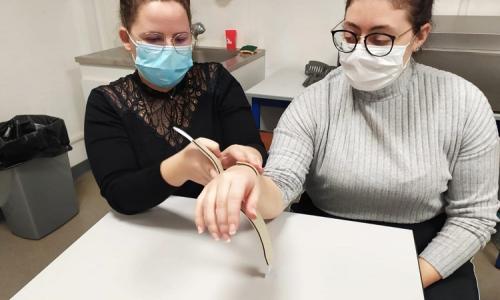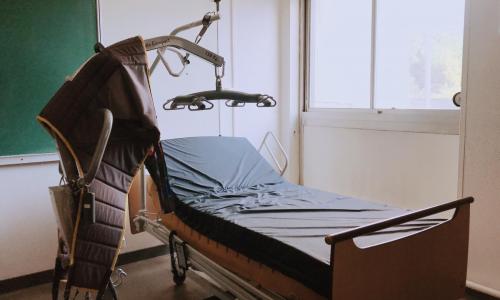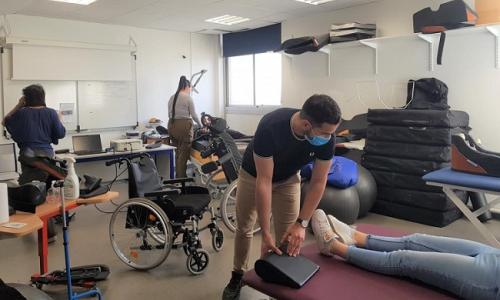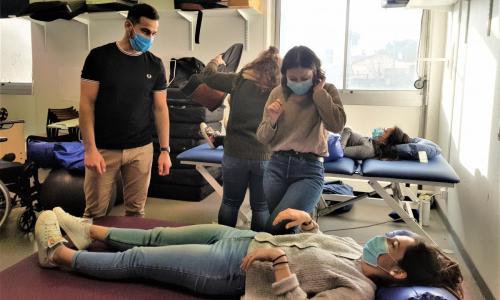Occupational therapy training takes three years and prepares people for the profession of occupational therapist, which promotes the social integration of vulnerable people.
The profession of occupational therapist
Occupational therapists are health professionals who promote the human activities and occupations of vulnerable people and people with disabilities in order to foster their full social participation.
The aim of occupational therapy is to maintain, restore and facilitate the activities of daily living in a safe, independent and effective manner. It prevents, reduces or eliminates situations of disability by taking into account the life habits of the people and their environment.
The occupational therapist is the intermediary between the person's adaptation needs and the demands of daily life in society.
Occupational therapy highlights the link between human activity and health: human activity or occupation is a vector of health, while isolation or loss of autonomy can have a negative influence on health.
In this way, the interventions make it possible to assess individual or collective situations and obstacles to activities; then to collaborate on solutions (care, advice, rehabilitation activities, environmental planning, etc.).
Professional perspectives
The activity is carried out in health or medico-social establishments, in home care services, in private practice, in communities or within associations.
It is possible to continue the initial training with a master's or doctoral degree in the humanities or medical sciences.
L’ergothérapie, met en évidence le lien entre activité humaine et santé : l’activité ou occupation humaine est vectrice de santé, alors que l’isolement ou la perte d’autonomie peuvent avoir une influence négative pour la santé.
Ainsi, les interventions permettent d’évaluer les situations individuelles ou collectives et les obstacles aux activités ; puis de collaborer sur des solutions (soins, conseils, activités de réadaptation, aménagement de l’environnement, etc.).
Perspectives professionnelles
L'activité s'exerce en établissements sanitaires ou médicosociaux, en services de soins à domicile, en libéral, dans les collectivités ou au sein d’associations.
Il est possible de poursuivre la formation initiale par un master ou un doctorat dans le domaine des sciences humaines ou sciences médicales.
Profil des professionnels
Les ergothérapeutes accompagnent des personnes vulnérables, avec une situation de handicap parfois importante qui nécessite une relation thérapeutique de confiance, de l'écoute et de la bienveillance.
Enquête sur l'insertion professionnelle :
- DE ERGOTHERAPIE - Tableau de bord après obtention du diplôme - situation au 1er mars 2023
Situation à 6 mois :
| En emploi | 83,3% |
| En poursuite d'études | 4,2% |
| En recherche d'emploi | 12,5% |
| Taille de l'échantillon | 29 réponses |
How to access?
There are three possible access routes:
- first year of access to health studies
- specific competition occupational therapy
- competition dispensations
See the conditions of admission to the training course and the administrative registration procedure.
Training organization
The training that prepares for the State diploma of occupational therapist takes 3 years (6 semesters and 180 ECTS), equivalent to the bachelor's level (bac +3).
At the end of the 3rd year, the diploma is awarded after validation:
- teaching units and internships
- presenteeism in practical and tutorials
- a thesis at the end of the study.
See the procedures for testing skills and knowledge.
Teaching and internships
Theoretical courses (60%) represent 2000 hours (794 hours of lectures - 1206 hours of tutorials). The clinical and situational teachings (40%) represent 1260 hours in the form of internships. Additional personal work is also estimated at 1888 hours minimum.
See the teaching programme.
Equipment
Occupational therapy training is located at the North site.
Teaching takes place in TD rooms equipped with technical aids (wheelchairs, sick lift, medical bed, transfer aids, meal aids, etc.), simulation kits, and an educational apartment equipped for people with disabilities.
Tuition costs
In case of admission to the course, the fees per year of study are :
- Student and campus life contribution (CVEC): €91
- university registration fees: 170 €.
The training is also accessible in continuing education: 5 205 €.
Scholarships and financial aid
In case of admission to the course, students can apply for a scholarship from the South PACA Region "in the health and social work fields". Eligibility conditions must be met before the start of the course. If you are not eligible, other funders can intervene.
Note: occupational therapy students do not have access to CROUS grants.
Internship students receive per diems and mileage allowances to cover their clinical training costs (travel, accommodation, etc.).
Student intranet
For more information access the student intranet.
Student intranet
For more information access the student intranet.
Regulation
- Order of 5 July 2010 concerning the state diploma of occupational therapist
- Arrêté du 17 janvier 2020 relatif à l'admission dans les instituts préparant aux diplômes d'Etat de pédicure podologue, d'ergothérapeute, de psychomotricien, de manipulateur d'électroradiologie médicale et de technicien de laboratoire médical








